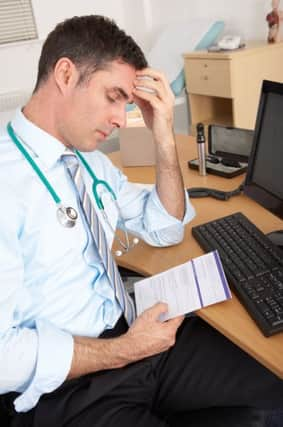New Scottish GP medical courses '˜too little, too late' for crisis


The new courses will focus on general practice and supports the aim to increase the number of GPs by at least 800 over the next decade, with a route new route for experienced healthcare professionals to enter medicine also being introduced.
However, the plans – which will see places created at the Universities of Aberdeen, Edinburgh and Glasgow – were slammed by opposition parties, who accused the Scottish Government of doing “too little, too late”.
Advertisement
Hide AdAdvertisement
Hide AdAccording to the Royal College of General Practitioners Scotland, there will be a recognised shortfall of 856 whole-time equivalent GPs by 2021.
The five-year course, said to be the first of its kind in the UK, will be part-time and largely online for the first three years, enabling participants to continue working in their current role as they study.
Glasgow and Aberdeen universities will offer 30 places each on the new courses with a greater focus on general practice. A total of 60 place come into force in 2019-20, with 25 more starting in 2020-21, increasing the number of medical places at Scottish universities to a record 1,038.
Health Secretary Shona Robison said: “The innovative proposals from Aberdeen, Edinburgh and Glasgow universities will see 85 new places to specifically promote general practice as a long-term career for young doctors and allow experienced healthcare professionals who may be interested in becoming doctors to enter medicine.
“The courses will include more involvement of GPs in teaching and assessment and enhanced GP placements in deprived and rural settings.
“These new medical places are a further step we are taking to train and retain more family doctors in Scotland.”
The move comes as doctors’ organisations warn of a GP shortage, amid concerns over Brexit and Scottish Government statistics published in March showing a “continued decrease” in the number of GPs working full time – with this having fallen from 51 per cent in 2013 to 37 per cent last year.
Lekaashree Rambabu, chairwoman of BMA Scotland’s medical students committee, said: “While the increased use of GP placements for these new medical school places may ultimately help to encourage some graduates to choose general practice, the education that these students receive will still need to provide the broader medical teaching that enables them to pursue careers in any chosen medical specialty.
Advertisement
Hide AdAdvertisement
Hide Ad“Increasing the number of medical students will also only lead to more doctors working in the NHS if there are enough foundation places for them to move into after graduation.”
Currently, health professionals such as nurses and paramedics who want to retrain as doctors are required to complete a full-time undergraduate degree programme.
Dr Alasdair Forbes, deputy chairman (policy) of RCGP Scotland, said: “RCGP Scotland welcomes these additional medical student places towards general practice.
“Previous research has shown that Scottish-domiciled students are more likely to stay here once they graduate and so we hope these initiatives provide impetus to Scottish-based applicants.
“GP tutors are excellent role models and we are confident that increased exposure to and experience of general practice will help these students appreciate what a rewarding and interesting career GP is.
“This is a welcome initiative as part of what must be a whole set of solutions to help address the fall in GP numbers.
“We have to recognise that these students will not translate into practicing GPs for another ten years or longer. Continuing work will need to be done to address the more immediate and problematic shortfall of 856 whole-time equivalent GPs by 2021.”
But opposition political parties were quick to attack the new Scottish Government initiative, claiming the number of places was too few and it would take ten years to bear fruit in terms of new GPs.
Advertisement
Hide AdAdvertisement
Hide AdMiles Briggs, Scottish Conservative health spokesman, said: “With Scotland short of an estimated 856 doctors, the addition of 85 training places will not do enough to meet this need, especially as GPs take about ten years to be fully trained.
“The SNP’s cap on the number of Scots-domiciled students able to get a place at a Scottish medical school is still the largest barrier to having enough Scottish GPs.
“The GP crisis that the SNP have presided over in Scotland in the last 11 years has led to the current shortage of doctors and this is too little, too late.”
Scottish Liberal Democrat health spokesman Alex Cole-Hamilton MSP said: “This is far too little, too late from the SNP government.
“On Shona Robison’s watch, a quarter of [GP] practices now have vacancies, up from just 9 per cent five years ago. I have uncovered posts that have been vacant for two years, and the BMA has warned that doctors are under pressure like never before.”
Anas Sarwar, Scottish Labour health spokesman, said: “Scottish Labour welcomes any investment in our NHS. But the reality is that after more than a decade in power the SNP’s legacy on our heath service is creating a workforce crisis. This is yet another sticking plaster solution by an SNP government is putting Nationalism before our National Health Service.”